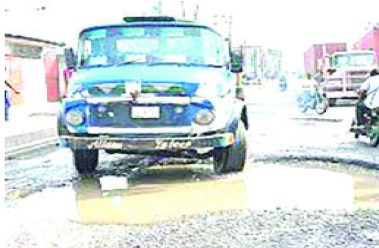By Foster Obi
Motoring/Maritime Editor
Maritime stakeholders are lamenting that the stretch of road from Coconut through Tin Can to Apapa Wharf, Lagos is the worst in the country.
Those who spoke to TheNiche include freight forwarders, importers, Custom officers, and agents.
Chukwumalu Emeka, a freight forwarder said being the gateway to the economy, the port deserves better access road.
“This is the road that takes heavy-duty vehicles more than any road in the country, yet it is not given the right attention. A road like that needs regular maintenance, it is not a road you do once and abandon it”, he argued.
Osita Chukwu, the president of Save Nigeria Freight Forwarders, Importers and Exporters Coalition (SNFFIEC), said the government should be more imaginative in handling the road to avoid giving the country a negative name tag among the comity of nations.
David Pius of Uburu Maritime added that the road had remained that way because of the insincerity of those at the seat of power.
He said because of corruption and needless politicking, the port access road has been left uncared for while leaving port users stranded for hours because of traffic gridlock.
A Customs officer who spoke in anonymity said: “This is the worst road to any port in the world even in smaller African countries.”
He urged the government to take more than passing interest on the road as regular traffic gridlock scares away investors who are time conscious.
“The stretch of road we are talking about is not that long. This is the gateway to the nation’s economy.
“The government officials are siphoning billions of naira into private accounts yet this road that could help transform the economy is forgotten.
“It shows we are not getting our priorities right and have become a laughing stock in the world,” he lamented.
For years, no vehicle goes beyond Coconut except Tin Can and Ro-Ro Ports-bound trucks, which on a good day spend at least one and half days from that point before getting into the port.
“This is the cruel fate of those who must do business along this corridor that one either treks the long distance already made horrible by the fumes coming from the exhaust pipes of the trucks and stirred dust, or less harmfully bathes in the dirty pools of water on both sides of the road during the rainy season,” an observer declared.
Analysts are not surprised that tricycle taxi (Marwa) operators have taken over the route since vehicles are not able to gain access.
“Expectedly, and with some disguised relief, commercial cyclists mushroomed along this corridor.
“Their numbers, particularly at rush hours, will conveniently compete with that of stirred bees ready to sting all in a mad rush to make a quick return.
“But they also provide invaluable, incontestable and monopolistic service.
“The number of operators had surged sharply following the onslaught of the Islamist terrorist group, Boko Haram, which rampaged through the North East, killing many in sight and harvesting others in its failed bid to establish an envisaged Islamic caliphate”, an analyst noted.
They want a more inclusive Schedule II of the Lagos State Road Traffic Law, which banned commercial motorcycles and tricycles from the highways as re-introduced by Governor Akinwunmi Ambode.
Passed into law in 2012, Fashola had challenged those supporting the unregulated operation of motorcycle taxi (Okada) riders to take a trip to hospitals and medical emergency centres to see the havoc caused by the Okada riders.
He argued that the new traffic law entailed quality life for everyone, the protection of every residents’ assets and businesses.
















